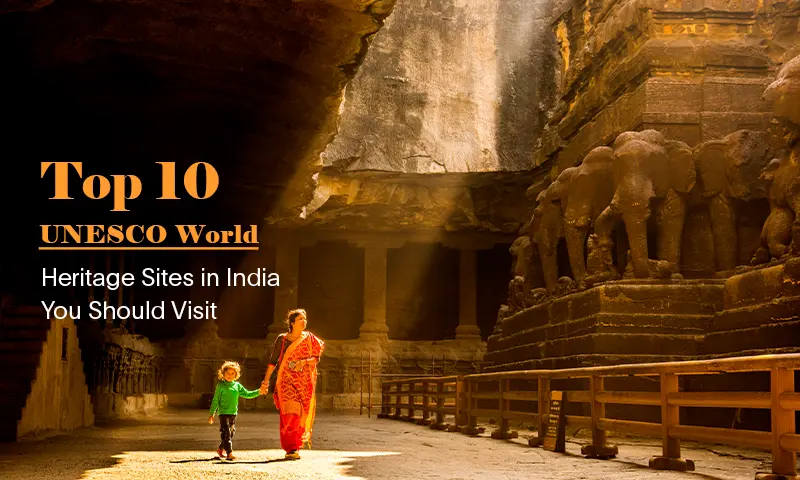
India is synonymous with a rich history, diverse culture, and architectural marvels that attract travellers worldwide to explore its diversity. The country is home to several UNESCO World Heritage sites that are an excellent example of unity in diversity. These sites hold historical, cultural, and natural significance, making them must-visit travel destinations. From ancient temples to stunning forts and natural wonders, here are ten UNESCO heritage sites in India that you should explore at least once in your lifetime. Continue reading this blog by Memorable India:
Here is the list of some UNESCO heritage sites in India that one should visit to discover their royal heritage and unique charm:
One of the seven wonders of the world, the Taj Mahal is a stupendous white marble mausoleum built by Shah Jahan, Mughal Emperor in remembrance of Mumtaz Mahal, his beloved wife. It is considered the ultimate symbol of love and features intricate Mughal architecture, delicate carvings, and an engrossing reflection in the surrounding water. The Taj Mahal is best visited at sunrise and sunset when the changing colours of the sky bathe its beauty.
Location: Rajasthan
Famous for: Pink-hued buildings, historical palaces and Rajputana architecture.
UNESCO Declaration Year: 2019
The capital city of Rajasthan, Jaipur, is a vibrant blend of history and culture. Known as the ‘Pink City’, Jaipur boasts majestic forts, stunning palaces, and bustling bazaars. Key attractions include the Amber Fort, City Palace, Jantar Mantar, and Hawa Mahal. Jaipur is part of India’s Golden Triangle tourism circuit and offers visitors a glimpse into royal Rajput heritage and architecture.
Once the grand capital of the Vijayanagara Empire, Hampi is an open-air museum of incredible ruins. The site comprises over 1,600 ancient structures, including temples, markets, palaces, and stepwells, surrounded by giant boulders and lush greenery. The Virupaksha Temple, Vittala Temple, and Lotus Mahal are among the top highlights. Hampi is a heavenly kingdom for history lovers and photographers alike.
Khajuraho’s Hindu and Jain temples are world-famous for their exquisite sculptures and intricate stone carvings of human and animal forms in erotic poses. Built between 950 and 1050 CE by the Chandella dynasty, these groups of 85 temples in a 20 sq. km area depict various aspects of life, including spirituality, dance, music, and love. The western group of temples featuring theKandariya Mahadev Temple is most popular among tourists.
The Ajanta and Ellora Caves are two of India’s most fascinating rock-cut caves complexes. Ajanta caves date back to the 2nd century BCE to 650 CE and are famous for their detailed Buddhist murals and paintings. Ellora Caves showcase Buddhist, Hindu, and Jain temples, including the impressive Kailasa Temple, curved out of a single rock. These caves highlight India’s mastery of art and architecture during ancient times.
Home to the world’s largest population of One-Horned Rhinoceroses, Kaziranga National Park is a paradise for wildlife enthusiasts. Located in the flood plains of the Brahmaputra River, this park is known for its rich biodiversity, including elephants, tigers, wild buffalos, and swamp deer. A Jeep Safari or an elephant safari is the best way to explore the park and witness its magnificent wildlife. Include this national park in your India Tour, and be amazed by its 15 endangered Indian faunal species.
The Sun Temple of Konark, built in the 13th century, is a magnificent Kalinga architectural masterpiece dedicated to the Sun God, Surya. Designed in the shape of a grand chariot with intricately carved stone wheels, horses, and figures, the temple is the symbol of India’s artistic and engineering brilliance. This temple is among the seven wonders of India and is considered one of the largest Brahmin sanctuaries in the country. Though partially in ruins, the site continues to captivate visitors with its grandeur and spiritual significance.
Located in the heart of Delhi, the capital of India, Red Fort was built by Emperor Shah Jahan when he came from Agra to Delhi. The fort is considered the political hub of the Mughals. The Mughal architecture, stone carving, and Indo-Islamic, Timurid, and Persian forms of architecture make this stand out among others. It is an awe-inspiring heritage site that the Archaeological Survey of India directly manages.
Built by the powerful Chola dynasty under the reign of Rajaraja 1 between the 11th and 12th centuries, the Great Living Chola Temples include Brihadeeswarar Temple (Thanjavur) dedicated to Lord Shiva, Gangaikonda Cholapuram Temple, Airavatesvara Temple (Darasuram). These temples are known for their massive structures, intricate carvings, and bronze sculptures. Thousands of years ago, rituals were still followed in these temples that reflect the heritage of Tamil Nadu.
Bodh Gaya is one of the most popular UNESCO heritage sites, and it is included in our Heritage Tour Packages. It is a pilgrimage site for Buddhists, as it is believed to be where Siddhartha attained enlightenment and became Gautam Buddha. It is under the Bodhi Tree, which is located in the complex. Thousands of devotees across the world came here to seek blessings and meditate in the serene and peaceful surroundings.
India’s UNESCO World Heritage sites are a testament to the country’s glorious past and architectural beauty. Whether you are a history buff, an archaeologist, or a nature lover, these sites offer unforgettable experiences. We hope this blog brings excitement within you to set foot on these heritage sites and explore the stories each of these sites tells. Book a Heritage Tour in India with us. Pack your bags, and start a hassle-free journey as history, culture, and heritage await you!